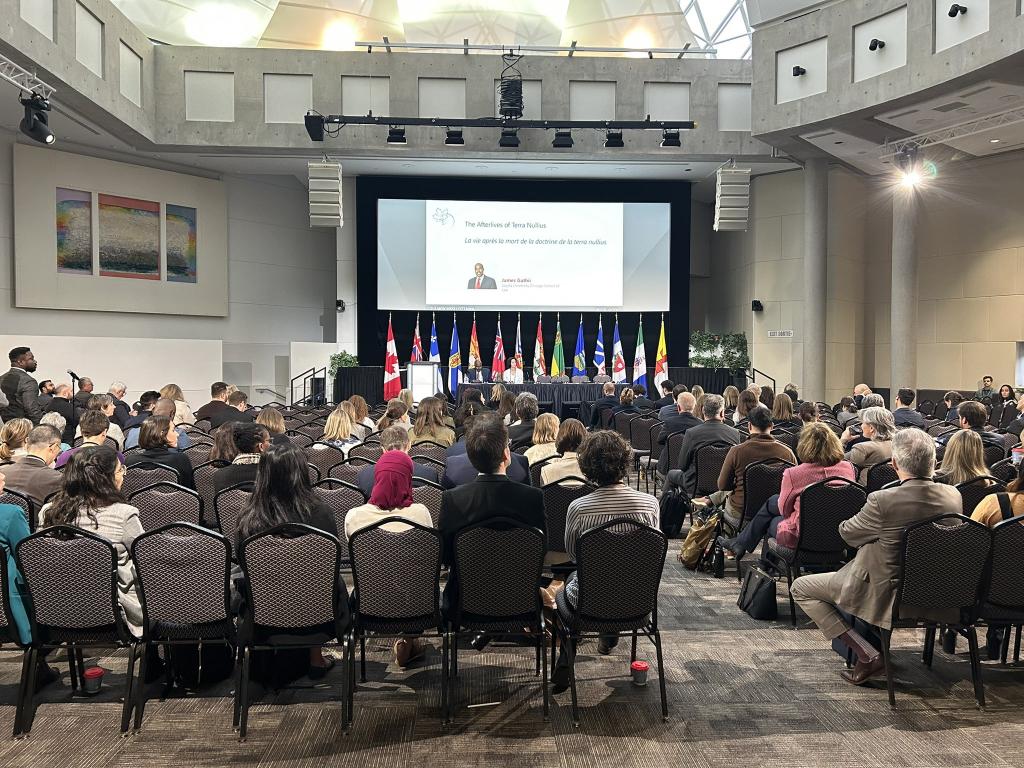Secondary menu
International Law at its Intersections: Transnational Business and Human Rights
Reflections from the 52nd Annual Canadian Council for International Law Conference
By: Foti Vito (3L) Credit: Olabisi D. Akingube
Credit: Olabisi D. Akingube
Attending the 52nd annual conference of the Canadian Council for International Law (CCIL), held in Ottawa from November 2-3, 2023, was an incredibly insightful experience, made possible through the support of the International Human Rights Program (IHRP). The conference, themed “Inside the Venn: International Law at its Intersections,” presented a unique opportunity to complement my experience as a student in the newly returned IHRP clinic.
The CCIL conference highlighted how practitioners of international law are increasingly operating at the intersections of diverse legal issues. As international law intersects with domestic legal orders in particular, there is a heightened need for collaboration with subject matter experts who can enrich traditional legal approaches with interdisciplinary insights. The conference’s exploration of these dynamics reflected the new and interdisciplinary vision of the IHRP clinic, which is now focused on advancing corporate accountability, climate justice, and Indigenous rights. As a student in the IHRP clinic, a few of my peers and I are supporting an anticipated lawsuit involving allegations of serious human rights abuses committed by a Canadian resource extraction company operating abroad. In light of my clinic project, during the conference I focused on deepening my understanding of the intersections between transnational business and human rights, a recurring theme across several of the panel discussions.
One of the panels, "Strengthening Human Rights Through International Economic Law Actions – The Right Tool for The Job?", delved into the appropriateness of using trade and investment law as instruments for strengthening global human rights. The emergence of legislation related to corporate human rights due diligence, such as Canada’s new forced labour and supply chain reporting law, is a clear indicator of this shifting landscape. The panelists emphasized the need for mechanisms that mandate broader societal consultation in trade and bilateral investment agreements, underlining the evolving nature of human rights issues in transnational business.
Another intriguing session was "Arbitration Beyond Investor-State Dispute Settlement: New Intersections in International Law.” A main focus here was The Hague Rules on Business and Human Rights Arbitration, an innovative set of model rules that enable communities to arbitrate against corporations in business and human rights disputes without requiring the involvement of states. The challenge, however, lies in obtaining corporate consent for such arbitrations. A thought-provoking proposal suggested making this consent a prerequisite for foreign investors seeking access to investor-state dispute settlement against host countries.
Lastly, the panel on "The Intersection of Jurisdiction and (International) Human Rights Law” particularly resonated with my experience in the IHRP clinic. A compelling point was made that without access to jurisdiction, rights remain unenforceable, highlighting the tension between the law of jurisdiction, which is primarily focused on peaceful co-existence between states, and international human rights law, which seeks to uphold fundamental individual values. I was reminded how this tension is prevalent in domestic claims against Canadian corporations for alleged human rights abuses committed abroad, where the issue of forum non conveniens often arises. During the discussion, the panelists underscored the limitations of relying solely on courts to advance international human rights, highlighting a sentiment also found in the realm of transnational business, where the need for government regulation is increasingly recognized.
Reflecting on my attendance at the CCIL conference overall, the experience meaningfully enriched my perspective as a student in the IHRP clinic. The diverse keynotes and panels provided me with a more nuanced understanding of emerging issues within the realm of international law, especially as they relate to transnational business and human rights. The conference's interdisciplinary focus emphasized that effective international lawyering calls for collaboration, creative legal thinking, and strategic policy engagement. The conference also provides students with an excellent opportunity to learn about career paths in international law and to network with representatives from different government departments, law firms, and non-profit organizations. I strongly encourage students with an interest in international law to consider joining next year’s event!
